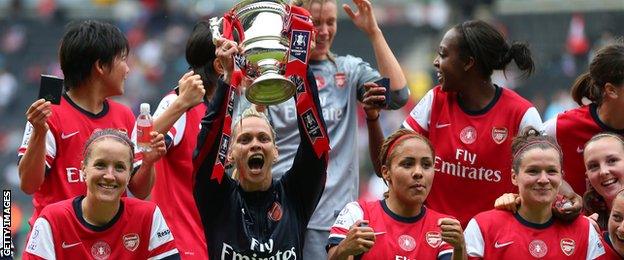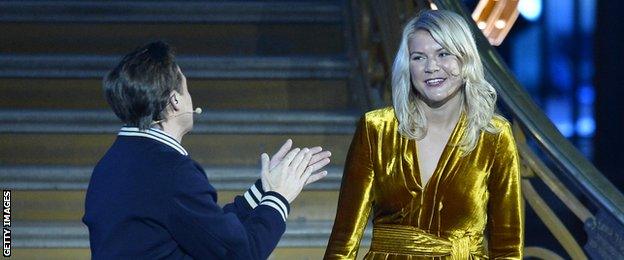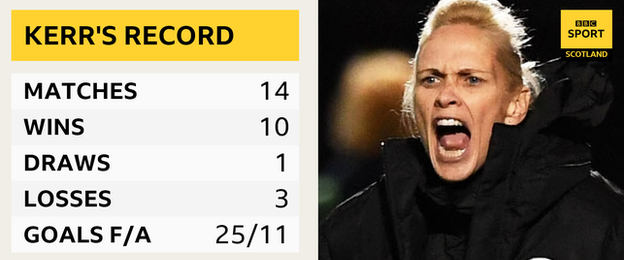Scotland boss Shelley Kerr's odyssey from borrowed boots to World Cup finals draw
- Published
- comments
Shelley Kerr's first cap was in 1989 with her second in 2001
They'll arrive at La Seine Musicale on Saturday: the elite of women's football gathered together on an island in the western suburbs of Paris for the 2019 World Cup draw.
Representing Scotland, head coach Shelley Kerr will be in the midst of it. It's safe to say that her dad, Jimmy, will not.
Kerr laughs when she talks about how grounded her family is, how unimpressed her father would be by the show that Fifa is bound to put on: "Dad says, 'hey hen, you're never off that telly these days. The only thing your face isn't on is a bag of cement'. Your feet are never in any danger of leaving the ground in our house.
"I remember when I was still playing for Scotland and we lost 4-0 against Germany and I went to see my parents afterwards. I had a cold. He says, 'what's wrong with you?' I said, 'Ah, just a few sniffles, dad'. He says, 'Aye, from the wind from all those Germans running past you'."
Jimmy and his wife, Christie, and their two sons and their other daughter will be bursting with pride, there's no doubt about that. They, more than all others, know about the epic journey their daughter and sister has taken over the years - all the inner strength and drive she's needed along the way.
Here's a snapshot. Kerr won her first Scotland cap in 1989, had her daughter, gave up playing for eight years and then won her second of 59 caps in 2001.
She tells a story about her return to the international fold. She'd had a medical scare and had just undergone a biopsy earlier in the day when the phone rang and with it came the offer of a Scotland trial. She didn't hesitate. She went, she played, she won the day.
'Resilience' is a word she uses a lot about her players. It could just as easily be applied to herself.
Hand-me-down boots & Ipswich tops
Hers is a story of undiluted love of football, from Polbeth, the old mining village in West Lothian where it all started, to Paris, the city of love on the banks of the Seine where the latest chapter will unfold on the weekend.
"My first pair of boots were hand-me-downs from a lad that stayed in the village, a lad called Alex Bathgate who was five years older than me but who was really small," she says. "My first jersey was a Hearts top that my uncle bought me. There was no Livingston FC back then, so Hearts were my local team. It was old acrylic, maroon, big badge, big collar. Brilliant.
"A new football strip was always on my Santa list. I remember I got the Ipswich strip one year and it was incredible because Ipswich were really good then and nobody else had their strip - blue with white pinstripes.
"I can still see it yet. At Christmas, I didn't care about anything else as long as I got a jersey - and a ball. A real ball, like you saw on the TV."

Shelley Kerr led Arsenal to FA Cup success in 2014
Kerr had the same dream as all the boys in school. She wanted to play football and take it as far as she could, which, in her case, wasn't all that far in the beginning. When she went to secondary school, she was allowed to train with the boys but wasn't allowed to play in matches. Those were the rules.
"It shattered me," she recalls.
"I was about 13 years old and I ended up playing for a team called Edinburgh Dynamo, which was a woman's team. Mum would walk me to the train and off I'd go.
"Because I was so little, I was a substitute for two years. It didn't put me off. I looked up to the players. I had respect.
"Those were the values of my family. Nothing came easy. Dad was a joiner and Mum was a nurse caring for the elderly. The only time they took a day off work was when there was a death in the family or if a close friend had passed away.
"I knew that I had to earn my place in the team. Working hard was the only way to do it."
Japanese culture & video recorders
Kerr made her international debut off the bench against England in 1989. She had to pay £50 to stay in the team hotel in the build-up to the match and there weren't enough tracksuits for all the substitutes on the sideline. One player had a tracksuit top, another had the bottoms.
There is still a massive way to go in the women's game, but that was another world compared to the one she inhabits now.
She would have liked to have gone to university, but the offer of full-time work was a precious thing and so, at 17, she joined the production line at the Mitsubishi Electrical plant in Livingston, where she stayed for 17 years, working her way up to management level.
Learning about the Japanese culture was critical to what came next, she says: "It was probably the most significant learning process I had and, more than anything else, it helped me become the manager I am because it was all about dealing with people and getting them to be efficient, effective, disciplined and organised.
"We made video recorders and we had to hit targets every day and it was competitive. I look back now and I see how those years influenced me."
'Everybody called me a tomboy. I hated it'
Football management was her destiny. She'd been quietly making a name for herself in Scotland when, in 2013, she got offered the Arsenal job. In her 16 months with the Gunners, she won three trophies. She quit to return to Scotland to pursue the university education she missed out on when going to work as a teenager.
That's when everything changed. Kerr noticed in the newspaper that Stirling University men's team were looking for a manager. She applied, did the interview and got a call telling her she had the job while she was still in the car on the way home.
She was in the office at 7am the next day - and the phone never stopped ringing. As Britain's first female manager of a men's club, she was in demand. It was when the calls started coming in from media outlets in Spain and Israel that she fully appreciated how big a deal this was.

Martin Solveig's comments as Ada Hegerberg he announced the Ballon D'Or winner caused controversy
All she wanted to do was come up with a gameplan for the weekend. Her new team were bottom of the league and they were going up against the team in second - they got a draw - but she knew, too, that talking and posing for photographs was all part of the deal.
One snapper asked if she wouldn't mind putting on a pair of high heels, a comment that brought a withering look. "I don't know why he asked that question," she says. "He obviously missed his medication that day.
"I didn't react to it. I made a face and those who know me will tell you that it's a face that tells you that you've gone too far."
Sexism, not just in football but in all of sport, remains pervasive. The Ballon d'Or has been awarded to male footballers since 1956. This week marked the inaugural women's Ballon d'Or, won by the remarkable Ada Hegerberg of Lyon.
We all know what happened next - DJ Martin Solveig's twerk remark hit the headlines rather than the brilliance of Hegerberg's football and the power of her victory speech that spoke to young girls everywhere.
Kerr knows this world too. "When I was a young girl and everybody called me a tomboy, did I like it? No, I absolutely hated it," she says.
"I still remember all the comments. They were isolated cases, but those isolated cases you never forget.
"I maybe don't talk about them much, but I never forget them. It makes you more determined to do better. When there's negativity, it's like a little switch and I flick it and say, 'Bring it on'."
That's the message now that she's heading for Paris. Bring it on. What an adventure her team had in qualifying, what scary moments they had to fight their way through to create history.

Scotland have won 10 of 14 matches under Shelley Kerr
"Those days will live with us forever, but we can't think about them just now," she stresses. "It's all about next summer.
"We played the USA, the world number one, in November and we did well. We lost 1-0, but we played a really good tactical game.
"I don't want to draw the USA on Saturday because they're serial winners. Brazil? I'm not one bit interested in drawing glamour countries. I'm hoping that we get a favourable draw that gives us the best possible chance of getting out of the group.
"Just being there is not enough. It's important we do ourselves justice in France. I've said to the players that our target is to get out of the group.
"It'll be tough, but that's the target. We're one of four newcomers to the World Cup - Chile, South Africa and Jamaica are the others - and so a lot of teams will want to draw us, but a lot of teams might get a surprise."
Back at home, Jimmy is preparing himself for Shelley overload on telly this weekend. He wouldn't have it any other way.
What an odyssey this has been, from borrowed boots, to shivering on the sideline with Edinburgh Dynamo, to a World Cup finals. If her team does well in the summer then a family friend should send the great man a special delivery - a bag of cement with his daughter's face on it.